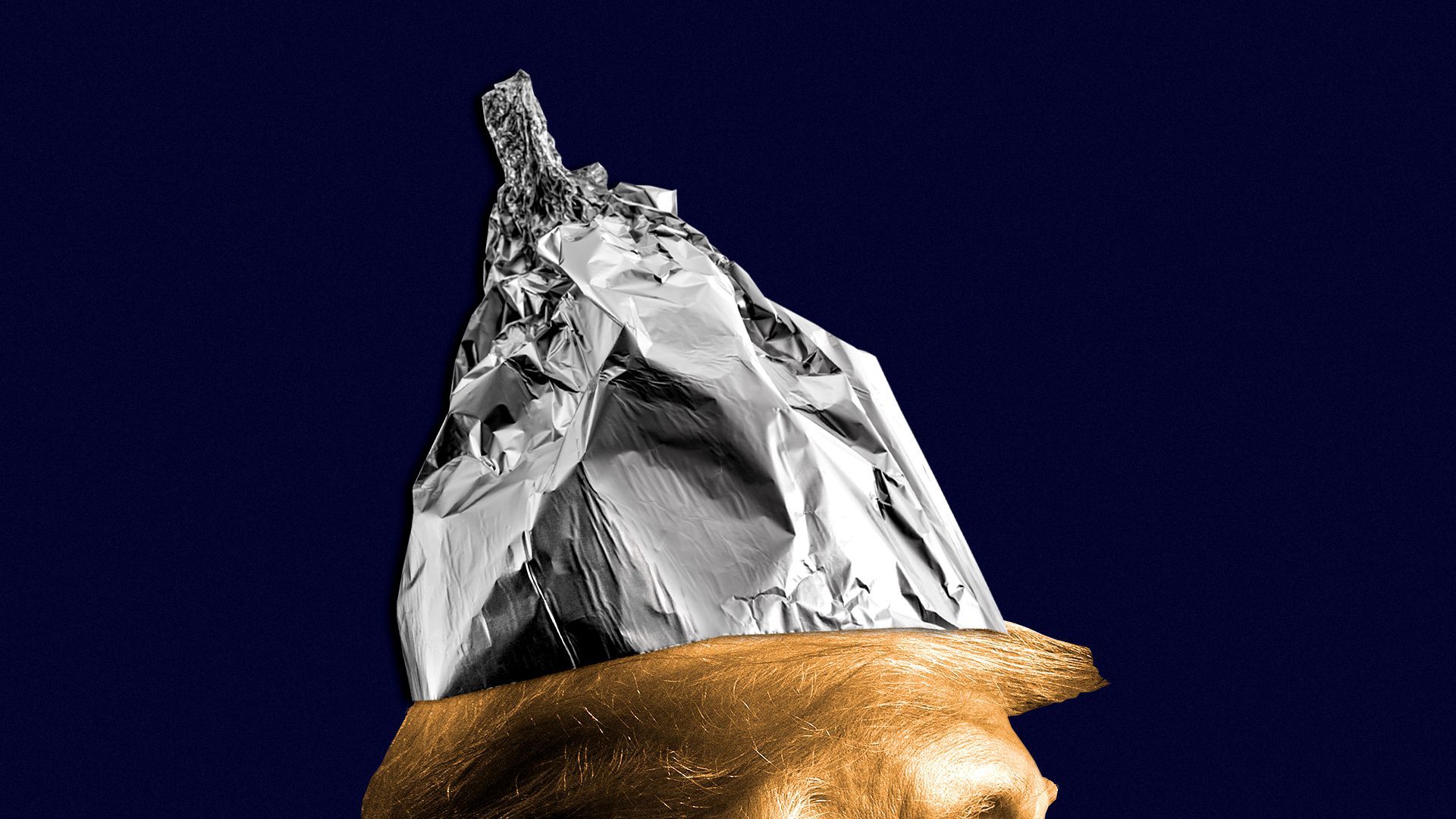Trump pushes fringe beliefs mainstream
Add Axios as your preferred source to
see more of our stories on Google.

Illustration: Annelise Capossela/Axios
Using his social media megaphone, President Trump has pushed once-fringe beliefs into the consciousness of everyday Americans.
The big picture: The coronavirus "infodemic" that has flooded the internet with misinformation and conspiracy theories has worn down people's already faltering trust in institutions, making it easier for fringe ideas spread by the president to go viral ahead of the election.
Where it stands: "Long-term trends about how fast fringe information moves into the mainstream have accelerated" says Jonathon Morgan, CEO of Yonder, an artificial intelligence startup that monitors mis- and disinformation.
- "This is a moment we've been building to for over a decade. But what we thought might unfold over the next 5–10 years, we're actually seeing unfold over a matter of months," Morgan says.
Driving the news: The president has ramped up his attacks on mail-in voting, claiming Democrats will use it to rig the November election by voting multiple times or other means, all illegal and most unprecedented or outright impossible.
- On Sunday, Twitter flagged a Trump tweet on the subject as violating its rules on election integrity. Facebook simply affixed a link to its election information hub, just as it does for all posts on voting from federally elected officials.
Trump's claims seem to be catching on, despite the lack of evidence to support them.
- While polling suggests people mostly support mail-in voting, a recent Gallup survey finds that nearly half of all Americans now believe it is vulnerable to fraud.
- Research this week from Yonder shows that fringe internet trolls right now exert the most influence on the online conversation on mail-in voting.
Several fringe ideas and conspiracy theories have been pushed further mainstream by the president, often via tweets to his 85 million followers.
- Unproven cures for the coronavirus have grown in popularity after the president has promoted them. Many Trump supporters remain convinced hydroxychloroquine is a miracle COVID-19 cure but that there's a conspiracy to obscure its efficacy in fighting the disease.
- Birtherism has mutated from false claims that President Obama wasn't born in the U.S., an idea Trump built his political career on, to casting doubt on the eligibility of Democratic vice presidential candidate Kamala Harris, who was born to immigrant parents in California. The idea, which Trump promoted earlier this month before easing off of it, "isn't necessarily supposed to be believed by everybody" but still "muddies the waters and clouds clear facts about why she would be eligible," says Bryce Webster-Jacobsen of cyber intelligence firm GroupSense.
- Tech censorship began as an idea most embraced by fringe online figures like Trump super-fans Diamond and Silk before becoming widely accepted in the GOP, with Trump as its top promoter. The idea that tech companies censor political speech they disagree with is now a commonly held belief among both Republicans and Democrats, according to a new Pew Research Center survey.
- QAnon continues to grow. President Trump, who praised supporters of the conspiracy theory last week, has retweeted QAnon followers at least 90 times since the pandemic began, and others in Trump's inner circle have also shared Q content. Nearly a dozen QAnon supporters are now 2020 Republican Congressional nominees.
Be smart: Conservative media outlets like Fox News, Breitbart and OANN are the end point in an established pipeline that takes fringe ideas from the internet and packages them for a presidential audience.
- "By the time fringe information reaches the president, it's gone through sources of information that, to him, are very reliable," says Morgan.
The bottom line: The office of the president makes Trump a uniquely potent vector for spreading fringe beliefs, particularly as some Americans' trust in other institutions crumbles.
- "When a figure that has inherent trust built into their position or role in society addresses a fact or idea, it provides validity to it," says Webster-Jacobsen.
Go deeper: The coronavirus conspiracy news cycle
